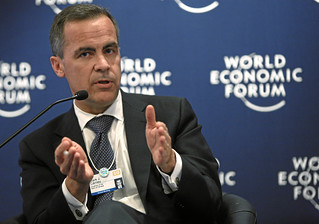 Or so energylivenews says (thanks to J). Their text is:
Or so energylivenews says (thanks to J). Their text is:
Governor of the Bank of England Mark Carney appears to agree most fossil fuels can’t be used if the world is to avoid climate change. At a World Bank event on Friday, he is quoted as saying: “The vast majority of reserves are unburnable.” This is a reference to the idea of a so-called carbon bubble – when investors in oil, gas or coal suppliers lose out on money because the reserves can’t be used.
I’ve bolded his words, the rest is editorial interpolation. I find this particularly irritating. If I’m reading about what Carney thinks, I want to read his words, not what someone else thinks about his words. I’m prepared to read analysis of his words, but it has to be primarily based upon what he said. Searching, I can find a bit more in the Graun:
The governor of the Bank of England has reiterated his warning that fossil fuel companies cannot burn all of their reserves if the world is to avoid catastrophic climate change, and called for investors to consider the long-term impacts of their decisions. According to reports, Carney told a World Bank seminar on integrated reporting on Friday that the “vast majority of reserves are unburnable” if global temperature rises are to be limited to below 2C. Carney is the latest high profile figure to lend his weight to the “carbon bubble” theory, which warns that fossil fuel assets, such as coal, oil and gas, could be significantly devalued if a global deal to tackle climate change is reached.
Here again we’ve got the same very brief quote surrounded by acres of unreliable interpolation. Did Carney actually warn about “catastrophic climate change”? In those words? We don’t know. Perhaps, as the text from the Graun above suggests, he only qualified his words with “if global temperature rises are to be limited to below 2C”, which is a very different matter. Indeed, what did he mean by “reserves” or “fossil fuel companies”? If he’s merely saying that we can’t burn all the coal without going over 2 oC then meh: that’s just the bleedin’ obvious, though the fact that he choose to say the bleedin’ obvious might be interesting. Nor is the meaning of “vast majority” obvious. If by “vast majority” he means, say, 90% then I think I’d find that surprising and non-obvious. But I’m not really up with burnable-resources proportions, please feel free to inform me. The Graun links to emergingmarkets.org but that, too, has the same tantalisingly brief quote about my topic. There’s a bit more quote:
The value of integrated reporting, he argued, was to help investors think about “not just things that can be managed in the short term” but also “costs companies are likely to be exposed to as policy responds to challenges” like climate change. He referred to a “tragedy of horizons” – the market failure by which actors including some investors, companies and governments are not looking far enough ahead to coming problems like the environment, even though these are known to them.
and here’s he’s on a reasonable topic for an econ-bod, possible market failures by not looking ahead far enough. Whether he’s right about that I don’t know; what I actually wanted to know was what he’d said about GW, since that was the headline.
The forum referred to is, I believe, How Integrated Reporting Facilitates Transparency and Financial Stability; October 10, 2014; Washington DC. But they don’t seem to have published any text. Anyone know where to find what he actually said?
I’m slightly puzzled this didn’t cross my radar earlier.
Refs
* Bank [of England] prods insurers about climate plans?
* Investors warn of ‘carbon bubble’ as Shell predicts climate regulation will hit profits?
